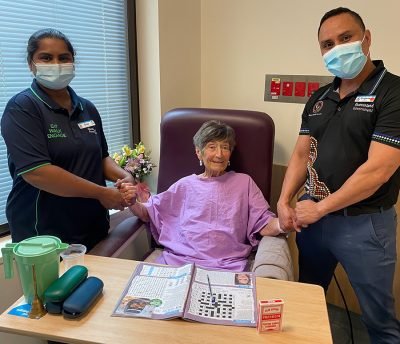Eat Walk Engage boosts care for older patients
A program aimed at preventing delirium by improving the care of older patients in hospital through simple changes in practice is having positive results.
The Eat Walk Engage program focuses on improving the mobility, cognitive engagement and nutrition of patients as a way of preventing delirium, a common condition affecting one in three older patients in hospital. Delirium is a serious disturbance in mental state that results in confused thinking and reduced awareness of the environment.

Eat Walk Engage Assistants, Suhasini Mallela (left) and Euggene Victorio (right) with patient Connie Slater.
Developed and first trialled at the Royal Brisbane and Women’s Hospital in 2011, the Eat Walk and Engage program has since been successfully implemented in 32 wards throughout 16 Queensland public hospitals including The Prince Charles Hospital (TPCH), Caboolture Hospital and Redcliffe Hospital, with positive results. A randomised controlled trial of the program highlighted that implementation of the Eat Walk Engage program can reduce the odds of delirium occurring by 47%.
Evidence shows that delirium can increase the risk of falls, complications, length of hospital stays, higher risk of going to a nursing home, increase in risk of death and potential increased risk of dementia. Research shows that ensuring patients maintain their nutrition and hydration, mobility and keeping their minds active can reduce delirium in older patients.
Eat Walk Engage focuses on the small evidence-based fundamentals of good care. With the support of Eat Walk and Engage Assistants, patients are encouraged and assisted to be mobile, eat and drink enough, and have activities to keep their mind active.
At TPCH, which has two wards running the program, the introduction of pocket talkers, an amplifying device to help patients with hearing impairment, is just one of a number of initiatives helping improve the stay of older patients.
TPCH Program Facilitator, Liana De Michele said that many older patients have hearing difficulties which makes communication on the ward extremely challenging.
“Not being able to hear properly can result in patients becoming confused and places them at increased risk of developing delirium,” Liana said.
Patient, Leonard said that before he had the pocket talker, he couldn’t hear anything.
“My hearing aid stopped working on the way to hospital and I didn’t know what I was going to do,” Leonard said.
“The doctors and nurses would talk to me, and I would just nod and hope I was nodding to the right things. The nurse brought me this and now I can hear everything and know what the doctors are saying to me.
“It means I can have a normal conversation and not have to ask everyone to repeat themselves.”
TPCH Eat Walk Engage wards have also introduced large print clocks to help orientate patients during their hospital stay, along with improved seating and layouts in patient lounges. Other initiatives supported by the program include daily ward newspapers, large print books, patient reading glasses, board games, cards, radios and engagement packs.
“These simple changes to practice make a big difference in helping patients be more engaged and active during their hospital stay – all important factors in providing good care and preventing delirium,” Liana said.
